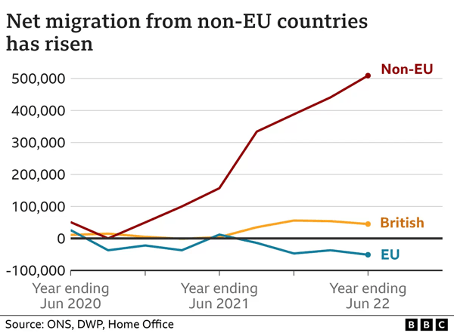These blogs and policy briefs were co-authored by multi-disciplinary teams of students on the MSc in Public Policy (MPP), Migration, asylum and human rights: UK, EU and global policy perspectives unit. The blogs and briefs were prepared in discussion during class and finalised by the students outside the formal teaching programme. The exercise proved to be very popular. It provided experience of team-work, collaborative research and practice in writing clear and concise text for public and policy audiences – Ann Singleton, Reader in Migration Policy.
This policy briefing was written by Dr. Hasan Tanriseven, Aina Batrisyia Busroni and Nicolas Roa Gutierrez.
Executive summary
The Home Office’s recent plan to restrict international students in the UK has sparked intense debate and controversy. This policy brief aims to analyse the potential impact of this plan on the UK’s higher education sector, economy and international relations. This paper first briefly overviews the Home Office’s plan and its rationale. Then, it examines the potential consequences of this plan on the UK’s higher education sector, including a reduction in the number of international students, a decline in the quality of education and a loss of revenue for universities. Finally, the paper explores the broader implications of this plan for the UK’s economy and international relations.
- The Home Office plans to restrict overseas students by introducing stricter visa requirements and additional university reporting requirements.
- Not only international students but also the influx of people from Ukraine and Hong Kong have increased the numbers of immigrants.
- International students are a significant source of revenue for UK universities, with 25.9 billion pounds being added to the economy annually.
- As international students of MMP, we are happy to be a part of a diverse community and expect support from the administration of the University of Bristol.
- Limiting the number of international students in the UK higher education sector will cause severe problems for universities and local economies.
- This plan could jeopardise the UK’s leading higher education and research reputation.
Introduction
International students have long been essential to the UK’s higher education sector, contributing to its diversity, quality and economic growth. According to recent statistics, international students in the UK contribute more than £25.9 billion to the UK economy each year (Universities UK, 2022). However, the Home Office’s recent plan to restrict international students in the UK has raised concerns about the potential impact on the sector, the economy and international relations.
Overview of the Home Office’s Plan
Net migration was exceptionally high in the first half of 2022. A series of factors converged, such as the conflict in Ukraine and the human aid route for Hong Kong citizens of British overseas national status. The Office for National Statistics (ONS) estimates reveal that the UK witnessed a net migration of 504,000 in the first six months of 2022, the highest ever recorded (Migration Observatory, 2022).
The home secretary has vowed to cut the number of immigrants to tens of thousands (Dathan, 2022). After revealing these figures, Rishi Sunak, the prime minister of the UK, wants to curb international students, especially those who take low-quality degrees and bring dependents to the country (Gieger, 2022).
 The UK had 679,970 international students studying in 2021–22. Exactly 463,315 sponsored study visas were issued in the period concluding September 2022, which was an all-time high (Universities UK, 2023).
The UK had 679,970 international students studying in 2021–22. Exactly 463,315 sponsored study visas were issued in the period concluding September 2022, which was an all-time high (Universities UK, 2023).
Since 2022, Home Secretary Suella Braverman has made several plans regarding her pledge to reduce the number of immigrants in the UK. One of her main focuses is international students (Syal, 2022). The reason behind her actions is that she would like to regain control of the border, asylum and immigration system of the country, which has experienced overflow within the past three years (Home Office, 2023). The policy initially differs from the agenda that was mentioned. There will be stricter requirements for international students who bring their dependants together (Stacey, 2022).
Additionally, earlier this year, another plan stipulated that international students who do not have a professional job within six months of graduating will be asked to return to their home country. This statement differs from the previous agenda, in which international students were permitted two years of working experience after applying for a graduate visa (Wilcock, 2023). The core objective of this plan is that the Home Office would like to reduce the number of international student enrolments altogether (Wood, 2022).
Debate among UK Government Departments over the International Student Enrolment Plan
The accumulation of these proposals has sparked a vigorous debate among the country’s citizens, international students, politicians, and MPs. Despite the Home Secretary’s efforts to clamp down on international students, the Department for Education, the Treasury, the Department for Business, Energy and Industrial Strategy and the Department for International Trade are all opposed to the move. Gillian Keegan, the education secretary, disagreed with the plan of action because she feels that the government should be proud of the arrival of international students to the UK (The Guardian, 2023). On the other hand, some argue that with lower levels of migration to the UK since Brexit, the UK is struggling with skill and labour shortages in several industries. Chancellor Jeremy Hunt has confirmed that immigration may be required to boost growth, especially in the face of a potential recession (BBC, 2022).
Potential Impact on the Higher Education Sector
Limitations on the entry of international students to the UK will significantly impact the higher education sector. The country has been continuously one of the leading countries chosen by students worldwide to continue their studies. This demonstrates that the UK’s education sector is easily adaptable to the needs of the international community, despite English being the main language of learning and daily communication. As a result, this opportunity promotes diversity in every institute of higher learning in the country.
The UK universities strongly opposed the plan. They expressed concern that imposing restrictions on international students could lead to billions of pounds in lost revenue, hamper their expansion plans and adversely affect the local economies (Universities UK, 2022). Furthermore, the chairman of the government’s Migration Advisory Committee said universities could go bankrupt if the UK government limits the number of international students to bring down net migration (Scotsman, 2022). Additionally, a decline in student numbers could adversely affect the quality of education and lead to a less diverse student population.
Effects on the UK Economy
Limiting international student numbers would affect the higher education sector and simultaneously damage the country’s finances. International students contribute 25.9 billion to the national economy annually. This accumulation is one of the main drivers of the UK’s economic growth. Additionally, the tuition fees charged by the government towards international students are higher than local students at every institute of study. Therefore, if the UK continues to reduce the number of international students, the country’s economic growth could be negatively affected (Adams, 2023).
Phil Deans (2022), the president and vice-chancellor of Richmond American University, claims that the government’s plan to limit international students threatened the UK economy’s vital sector and the UK’s soft power. He adds, ‘Can’t stop the small boats? Then stop the students’.
Impact on International Relations
This plan to limit the entry of international students to the UK will also impact the country’s international relations sector. This policy will cause the UK’s credibility as a country that accepts the diversity of society from various angles to be affected widely, as most of its reputation as a nation of diversity comes from the migration sector, with international students being one of the critical contributors to this reputation.
Jamie Arrowsmith, director of Universities UK International, says that the UK will also be regarded as a disadvantaged country and will be compared with other developed countries such as Australia and the US, whose governments do not limit the entry of international students as long as they meet the conditions set in previous years (Universities UK, 2023b).
A decrease in international students would harm the UK’s reputation and influence regarding cultural and diplomatic ties between countries. Thangam Debbonaire, a Labour MP for Bristol, has also criticised the government’s plan. During a conference at the University of Bristol, she stated that international students are part of the soft power of the UK and that the government’s plan was ridiculous.

One of the key aspects of the city of Bristol is diversity. It is known for its diversity, inclusivity and the celebration of different cultures, making it a welcoming and dynamic place to live and visit. Similarly, the University of Bristol is a friendly place and welcomes international students. Of a student body of some 27,000, a quarter are international, representing over 150 countries (University of Bristol, 2023). Moreover, more than half of Master of Public Policy (MPP) students are international students, and we are happy to be a part of this diverse community. As MPP students, we expect to retain this atmosphere and form the university administration.
Conclusion
While the UK government is fully committed to bringing down the number of immigrants, not only its effect on migration policy but also its adverse effects on other sectors should be considered. The Home Office’s plan to restrict overseas students has the potential to have significant consequences for the UK higher education sector and the broader economy, as international students contribute billions of pounds each year to the UK’s GDP. It is essential to maintain the integrity of the UK’s immigration system. However, it is just as necessary to recognise international students’ enormous contributions to the UK and ensure that the UK remains a welcoming and attractive destination for talented individuals worldwide.



Fantastic post! Never thought about this topic